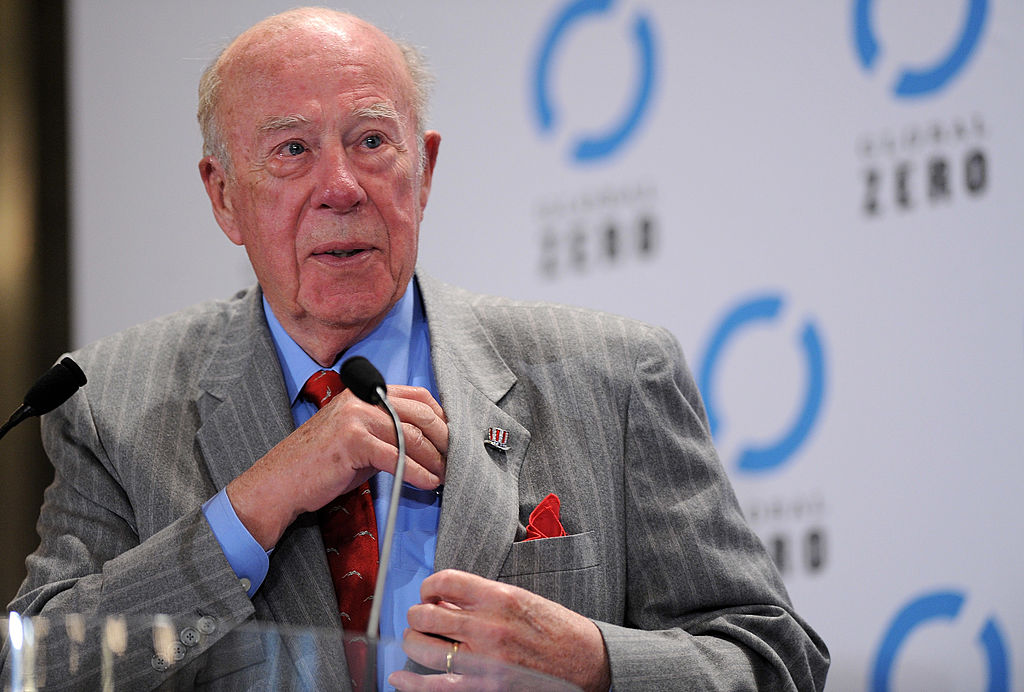George Shultz, Reagan's secretary of state who helped forge new relationship with Soviet Union, dies at 100


A free daily email with the biggest news stories of the day – and the best features from TheWeek.com
You are now subscribed
Your newsletter sign-up was successful
George Shultz, who served as secretary of state in the Reagan administration, died Saturday at his home in California, the Hoover Institution at Stanford University, where he was affiliated, announced Sunday. He was 100. The Hoover Institution did not provide additional details about his death.
Throughout his career, Shultz held four different Cabinet positions. Former President Nixon tapped him to serve as labor secretary, director of the Office of Management and Budget, and treasury secretary at different points throughout his run. As The Washington Post notes, Shultz developed a reputation for "good judgment and integrity," and he emerged unscathed from the Watergate scandal. In fact, Nixon did not appear to be very fond of Shultz, who refused to allow the Internal Revenue Service to investigate the president's political enemies.
Later, in 1982, Reagan selected him to lead the State Department, which he did for six-and-a-half years until the end of the Reagan's presidency, the second longest tenure of any secretary of state in the post-World War II era aside from Dean Rusk, who served under former Presidents John F. Kennedy and Lyndon Johnson. Reagan and Shultz reportedly got along well, though certain geopolitical issues would leave them at odds.
The Week
Escape your echo chamber. Get the facts behind the news, plus analysis from multiple perspectives.

Sign up for The Week's Free Newsletters
From our morning news briefing to a weekly Good News Newsletter, get the best of The Week delivered directly to your inbox.
From our morning news briefing to a weekly Good News Newsletter, get the best of The Week delivered directly to your inbox.
Shultz's most notable accomplishment was pushing Reagan to develop a more constructive relationship with the Soviet Union in the final years of the Cold War. Per the Post, Shultz viewed Mikhail Gorbachev as a new type of Soviet leader with whom Reagan could negotiate. The two leaders eventually reached a breakthrough, signing a nuclear arms treaty in 1987, and tensions continued to ease from there. Read more at The Washington Post.
A free daily email with the biggest news stories of the day – and the best features from TheWeek.com
Tim is a staff writer at The Week and has contributed to Bedford and Bowery and The New York Transatlantic. He is a graduate of Occidental College and NYU's journalism school. Tim enjoys writing about baseball, Europe, and extinct megafauna. He lives in New York City.
-
 5 calamitous cartoons about the Washington Post layoffs
5 calamitous cartoons about the Washington Post layoffsCartoons Artists take on a new chapter in journalism, democracy in darkness, and more
-
 Political cartoons for February 14
Political cartoons for February 14Cartoons Saturday's political cartoons include a Valentine's grift, Hillary on the hook, and more
-
 Tourangelle-style pork with prunes recipe
Tourangelle-style pork with prunes recipeThe Week Recommends This traditional, rustic dish is a French classic
-
 Nobody seems surprised Wagner's Prigozhin died under suspicious circumstances
Nobody seems surprised Wagner's Prigozhin died under suspicious circumstancesSpeed Read
-
 Western mountain climbers allegedly left Pakistani porter to die on K2
Western mountain climbers allegedly left Pakistani porter to die on K2Speed Read
-
 'Circular saw blades' divide controversial Rio Grande buoys installed by Texas governor
'Circular saw blades' divide controversial Rio Grande buoys installed by Texas governorSpeed Read
-
 Los Angeles city workers stage 1-day walkout over labor conditions
Los Angeles city workers stage 1-day walkout over labor conditionsSpeed Read
-
 Mega Millions jackpot climbs to an estimated $1.55 billion
Mega Millions jackpot climbs to an estimated $1.55 billionSpeed Read
-
 Bangladesh dealing with worst dengue fever outbreak on record
Bangladesh dealing with worst dengue fever outbreak on recordSpeed Read
-
 Glacial outburst flooding in Juneau destroys homes
Glacial outburst flooding in Juneau destroys homesSpeed Read
-
 Scotland seeking 'monster hunters' to search for fabled Loch Ness creature
Scotland seeking 'monster hunters' to search for fabled Loch Ness creatureSpeed Read
